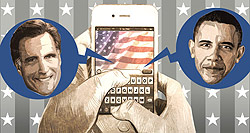 The line on mobile donations is
that this method of contributing to political campaigns allows activists or just inspired sympathizers to respond immediately to inspiration or just a plain old response to a call to action. According
to payvia, the company powering mobile contributions to both the Obama and Romney campaigns, one in ten donors to the 2012 Presidential campaigns at some point used either SMS or an in-app method to
send money to their candidate of choice.
The line on mobile donations is
that this method of contributing to political campaigns allows activists or just inspired sympathizers to respond immediately to inspiration or just a plain old response to a call to action. According
to payvia, the company powering mobile contributions to both the Obama and Romney campaigns, one in ten donors to the 2012 Presidential campaigns at some point used either SMS or an in-app method to
send money to their candidate of choice.
The smartphone is the always-there device that can respond on the spot to a range of inspiring moments. According to payvia, when an on-screen
text-to-donate prompt at the summer Democratic National Convention occurred during a speech from Obama campaign manager Jim Messina, there was a 61% spike in activity. Likewise, when Gov.
Romney’s campaign streamed his well-received first debate performance on his official site, a prompt for text donations nearby attracted a 96% growth in the volume of SMS donations within a day
(Oct. 3).
Mobile devices were integral to the political discourse leading up to last Tuesday’s election. According to metrics gathered by payvia from various public sources, 37% of all
voters used mobile devices to get or discuss political information, but among a key youth demographic -- 18- to-34-year-olds -- 56% were found to discuss political candidates over their mobile
devices.
Payvia contends that the levels of mobile use among the electorate to engage in politics in 2012 suggests an even richer role moving forward. According to some surveys, 60% of people
in the U.S. are ready to vote over their devices. Payvia predicts that in the 2016 Presidential cycle 50% of donors will use mobile means to support candidates. This method will become
increasingly important to the 2014 House and Senate races. Campaigns may well use devices to live stream events to a broader audience. The company also contends that social media sites for candidates
typically will have text-to-donate options. By 2016, payvia says we should see a fully “mobilized electorate,” which donates, interacts with campaigns and even votes over their mobile
devices. A full infographic of payvia's findings and predictions is available at Mashable.
Curiously, now we discuss the benefits of mobile as a donation device. In previous cycles we had been
talking about the ways in which mobile phones were making elections more transparent by putting a hidden videocam and audio recorder at every campaign event and private meeting. How many political
gaffes and revealing moments (not to mention the now-infamous Romney “47%” video) bubbled to public view because of portable devices? Mobility and the facility of people leveraging their
mobile devices in a multitude of ways have changed the political landscape across many dimensions. Perhaps for the better, politicians can expect no privacy and ever-diminishing off-the-record
moments.
Every smartphone owner is his or her own media organization exercising personal judgment over what should be public about encounters with public figures. One of the things that
mobility has erased in the current and recent cycles is the traditional journalistic buffer -- the gentlemen’s agreements between press and politicos over what is and is not fair game in public
discourse.